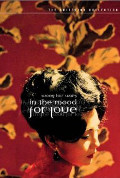
Directed by
Wong Kar-wai
98 minutes
Rated PG
Reviewed by
Bernard Hemingway

In The Mood For Love
Synopsis: In the early 1960s in Hong Kong, Mr Chow (Tony Leung) and his wife sub-let a room in an apartment block. The same day, Mrs Chan (Maggie Cheung) and her husband - who is overseas on business - move into the adjoining apartment. Slowly they get to know each other in circumstances which test their emotional resilience.
Elegant in conception and execution and refreshingly original, In The Mood For Love is both a masterfully-crafted study of a particular time and place and a superb evocation of the never-realized dreams that imbue the mundane.
The cinematography, by Australian Chris Doyle, and Mark Li Ping Bing, is outstanding, ravishing image piling upon image with rich colours and striking compositions, sustained by wonderful costume design and art direction crowned by the seductive form of Maggie Cheung (who had appeared very differently as Leslie Cheung's cast-off lover in Wong's Days of Being Wild, to which this film is thematically related).
Writer-director (and producer) Wong however deserves full credit both for his script, which takes an inventive approach to the plot and elliptical approach to the narrative, and for his superb directorial control over the project. Although not having the darkly ironic sensibility of Taiwanese director Tsai Ming-Liang's films, there are evident similarities in the way both directors use tightly structured visuals to evoke the passage of time and the thought-processes of their characters, not to mention their use of popular music (as well as the presence of interminable rain).
Maggie Cheung is superb as the spurned-in-love wife for whom appearances are all, an exotic, isolated figure trapped in her own dreams of perfection. Equally, Tony Leung is a perfect counterpoint as her erstwhile companion-in-adversity, whose dreams match hers. The development (and undoing) of their relationship within the circumstances of their cramped daily lives is a marvel of cinematic story telling, recalling the achievements of European masters like Renais in Hiroshima, Mon Amour (1959).
Although it is virtually impossible to mention any aspect of this film without using superlatives, for me the later parts of the film which rather abruptly cross temporal and spatial boundaries, skew the narrative, which was originally intended to extend the story up to the 1970s, overmuch, undoing its hermetic structure (Wong follows the story in a loose way in 2046 (2004). Notwithstanding, In The Mood For Love is an impressive achievement best seen on the big screen and unmissable for anyone interested in the poetics of cinema.

Want more about this film?


Want something different?




